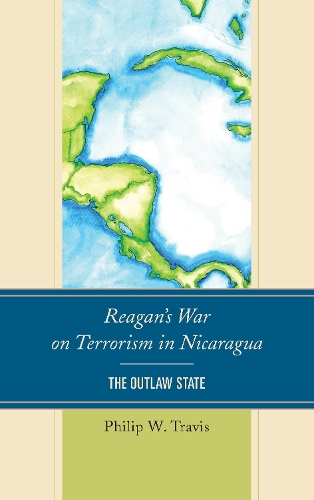
Reagan's War on Terrorism in Nicaragua: The Outlaw State
(Paperback)
Available Formats
Publishing Details
Reagan's War on Terrorism in Nicaragua: The Outlaw State
By (Author) Philip W. Travis
Bloomsbury Publishing PLC
Lexington Books
31st August 2018
United States
Classifications
Professional and Scholarly
Non Fiction
International relations
327.7307285
Physical Properties
Paperback
232
Width 152mm, Height 221mm, Spine 15mm
381g
Description
During the first two years of Ronald Reagans second term the United States developed an offensive strategy for dealing with conflict in the developing world. Nicaragua was a primary target of this policy. Scholars refer to this as the Reagan offensive: the first time that the United States eschewed the norms of containment and sought to roll-back the gains of communism. However, the Reagan offensive was also significantly driven by a response to the emergent threat of international terrorism. Terrorism provided a vehicle that justified its use of aggressive proxy war and pursuit of regime change in Central America. U.S. policy with Nicaragua demonstrates the importance of terrorism to the development of a more aggressive United States in the post-Cold War world. This book examines the influence of the U.S.-Contra War in establishing a precedent for the use of overt pre-emptive force against sovereign nations in the name of counterterrorism. In the 21st century, the United States undertook a policy with the world based on a broad definition of self-defense that called for an array of actions that often violated traditional norms of international law and recognition of sovereign rights. This book demonstrates that the precedent for this change occurred in the late Cold War as the United States sought to respond to an escalation of global terrorism. The emergent problem of terrorism in the 1970s and 1980s transformed how and when the United States applied force in the world.
Reviews
Philip W. Travis's original and important book exploits a wealth of new sources. It links Reagan's war on terrorism with his interventions in Central America, with fascinating results. -- George C. Herring, University of Kentucky
Linking U.S. foreign policy in Latin America with the War on Terror in the Middle East, this provocative book shows how President Ronald Reagan initiated a hyper-interventionist tendency in American policy. Regime change, torture, and support for the worst brutality became standard parts of the Reagan Doctrine. Philip W. Travis deftly shows how the president used the label of terrorism to justify otherwise unacceptable actions. This is an original and very timely book for readers who care about Latin America, the Middle East, and contemporary foreign policy. -- Jeremy Suri, University of Texas at Austin
In the spirit of Greg Grandin, Philip W. Travis explores the connection between President Reagans Central America policy and the deeper patterns that led to the War on Terror. In addition to extensive research in U.S. archives, Travis incorporates interviews with key figures, including Costa Rican President Oscar Arias Sanchez. The result is a thoughtful and provocative work that will make many readers think differently about questions of terrorism and regime change. Many have written on Reagans war in Nicaragua, but few have connected it to the rhetoric that has come to define the War on Terror. This is a bold work by a promising young scholar. -- Jason Colby, University of Victoria
Author Bio
Philip W. Travis is assistant professor of history at the State College of Florida, ManateeSarasota
